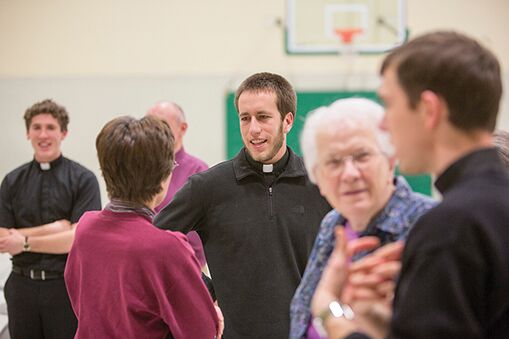
Chris McCoy, nSJ (center), visits with the parishioners at the Cathedral of St. Peter. McCoy and two other Jesuit novices provided a variety of spiritual services in the area during their six weeks in the archdiocese.
by Jessica Langdon
jessica.langdon@theleaven.org
KANSAS CITY, Kan. — They were here for just six weeks, but three Jesuit novices gained experiences to last a lifetime during their short stay.
As they have been in years past, the novices and their director and assistant director, from the Central and Southern Province of the Society of Jesus, were hosted at the Cathedral of St. Peter in Kansas City, Kansas.
The three novices — Matthew Hearley, nSJ; William Manaker, nSJ; and Christopher McCoy, nSJ — are in their first year of the novitiate with the Society of Jesus. Their days in the archdiocese included everything from leading a confirmation retreat at Resurrection School at the Cathedral in Kansas City, Kansas, to providing spiritual care to patients at Providence Hospital, to ministering to Catholic inmates at the Lansing Correctional Facility.
The novices did take time out of their busy days, however, to answer some questions from The Leaven about another Jesuit — Pope Francis — and what they are learning from his example.
Q. What seems very “Jesuit” about the pope to you — what about his life seems very similar to yours in some specific way?
A. One thing that strikes me as very Jesuit about Pope Francis is how he goes out of his way to care for those who are on the margins of society. The stories of Pope Francis going out at night to visit people living on the streets, or the images of him kissing lepers, or the recent video I saw of him making a spontaneous visit to a community of South American migrants who are living in a shantytown in Rome — they are wonderful examples of how he is very intentional in loving these types of people who are often neglected.
-Christopher McCoy, nSJ
Q. Pope Francis often talks about evangelizing the peripheries. What peripheries have you had the opportunity to work in so far, and what others do you hope to someday work in?
A. Here in Kansas City, we have had the opportunity to work with prisoners, as well as formerly imprisoned individuals. I am always taken aback by their faith and hope. They express a genuine need for the faith. It is essential to who they are and the direction their lives are going. There are few places in which I have seen such love and desire for Christ as they have. I hope to have the opportunity to work with the prison system in the future. It is a very broken place and is full of people who simply need to be loved.
– Matthew Hearley, nSJ
A. In just six months as a Jesuit novice, I have worked with students from low-income families, the elderly and homebound, prisoners and those recently released from prison, and the homeless. In just a few weeks, I will have the opportunity to spend some time working with the poor African-American population in East St. Louis.
In addition, I will spend two days a week assisting at a L’Arche community, which includes as its “core members” adults with severe physical and cognitive disabilities. In the future, I hope to spend some time working with poor communities in Central America, South America or Africa.
– Christopher McCoy, nSJ
Q. How do you receive your news of the pope? Do you read his homilies, and if so, do you discuss them in any particular setting?
A. Due to my other responsibilities as a novice, I don’t spend as much time staying up on the news as I might — about the pope or otherwise. . . . But I have had the opportunity to read some of his writings.
In his letter announcing the Year of Consecrated Life, Pope Francis spoke about how especially important it is that those of us in consecrated life “radiate the joy and beauty of living the Gospel and following Christ to the full” — something he urged all of the faithful to do in his pastoral exhortation “Evangelii Gaudium.”
I hope that along with my brother Jesuits and other religious, I can help to draw other people to Christ through my own witness of joy.
– William Manaker, nSJ
A. There have been times where we have read the Holy Father’s homilies in a group setting and discussed their significance to us as a novitiate community. It is helpful to discern together how we proceed with his guidance.
– Matthew Hearley, nSJ
Q. The pope talks frequently about his personal devotions and his prayer life. Has his casual discussion of his spiritual life influenced yours? If so, how?
A. I am often taught that developing a strong prayer life is critical for me as a Jesuit novice and that it forms the foundation of a Jesuit’s life and ministry. . . . Committing myself to my daily hour of prayer and my twice daily “examens” (where I reflect on how I’ve been alert to the way God is inviting me to respond to the opportunities that come my way) allows me to grow in relationship with God, and it helps me to be more loving to the people I come into contact with each and every day. Pope Francis is a beautiful example of how a life centered around prayer is one that is full of joy, a joy that is truly contagious.
– Christopher McCoy, nSJ
Q. The Jesuits are renowned for their practical spirituality. Do you see that same practicality in Pope Francis? What have you seen him do that is a true Jesuit “fix” to something?
A. The Jesuits are definitely renowned for their practicality. Ignatius (founder of the Society of Jesus) was a very practical man himself. In writing the “Constitutions of the Society of Jesus,” Ignatius was very strict in how everything in the Jesuits should be run. Yet he knew that there would need to be adaptations due to the local circumstances. He would write something along the line of: “If it better serves the greater honor and glory of God, feel free to do it differently.”
I see this practicality in Francis. He does not seem to be overly attached to a particular practice or way of doing things. He is focused on how he may better serve the church and work for the salvation of souls.
– Matthew Hearley, nSJ






